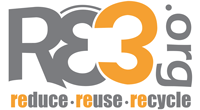 Guest Blogger – Michigan Mary
Guest Blogger – Michigan Mary
Most people know that recycling is good for the environment and many households engage in this activity because of this understood notion. However, the national recycling rate currently stands at approximately 32 percent which indicates that a good chunk of the American population is not engaging in this activity regardless of the implications. Here at RE3.org we recently heard about a program that makes sense to us, it’s called Recycle Bank and it is a program that actually pays people to recycle. Pretty cool concept, right?
Any initiative is bound to be more successful when individuals are receiving a direct incentive to engage in the activity. In fact the pilot programs for Recycle Bank were so successful that the initial communities went from recycling seven percent and 35 percent respectively to a 90 percent participation rate in both communities. Since then Recycle Bank has expanded to 90 municipalities and services 210,000 households. So far Recycle Bank has been able to more than double the recycling statistics in each of these communities.
The program works by putting a bar code on the side of the receptacle and weighing the amount of recycled materials each week produced by the household. Then the families are given a corresponding amount of points which can be redeemed for gift cards at places like Starbucks and Whole Foods. Larger stores like Bed Bath and Beyond and Target have also added their names to the list of eligible reward locations.
Recycle Bank is actively attempting to recruit more municipalities; however, there are some logistical hurdles that make it difficult for all communities to adopt this progressive program. First and foremost there is inherently a significant start up cost with this type of program. The city must invest in new infrastructure to enable the program to run as it is intended. The Recycle Bank bins are larger than the average recycling container and cost upwards of $85 a pop, which multiplied by a city the size of Raleigh is a significant initial investment.
However, it is vital that cities understand the essential nature of thinking about the long-term benefits of the program rather than the short-term obstacles. Although it is necessary to incur an initial financial hit communities must take into account the vast benefits of a stable and thriving recycling program. Markets for recycled products are currently depressed. When they do pick up again communities with effective and efficient programs will be able to garner vast financial benefits from the implementation of this noted program.
Recycle Bank is mutually beneficial for the consumer, businesses and municipalities. Cities need its citizens to encourage their local governments to think “outside the box” to come up with ways to innovate and improve their services. Do your part by contacting your local government and asking them about considering this exciting and original recycling initiative.

No comments:
Post a Comment